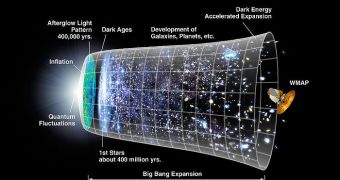Since the Big Bang theory was first formulated, astronomers and other scientists have been hard at work to either confirm it beyond a reasonable doubt, or show it to be false. At this point, it still remains the most popular explanation of how the Universe cam into being, and is widely accepted by the scientific community. Regardless of the consensus, there are still some unresolved issues related to this theory, and new experiments are currently being devised to find explanations for them, Space reports.
The general idea about the Big Bang is that it was a very powerful explosion, that generated time and space in an otherwise indefinable space. Everything that was sprung into existence at the time then expanded with enormous speed, until now, 13.75 billion years later, it grew to become what we name the Universe. All the particles inside, all the laws of nature, and all celestial bodies are therefore believed to have originated from the same source that was at first infinitesimally small.
There are, of course, other theories on how the Universe formed. String theory, for example, proposes that the Big Bang was not a unique event. In the 11 dimensions this theory operates with, the Universe is actually a loop of Big Bangs and Big Crunches, which see everything getting recycled over and over again. But this idea has failed to gain the amount of support its rival currently enjoys as it leaves even more questions unanswered, and also because it proposes so many dimensions working in tune.
Back to the Big Bang theory, the main reason for Discord among scientists is not that the Universe does not fulfill all theoretical predictions made based on the idea that the initial explosion happened. Experts tend to disagree on other things, including what happened at the very fraction of the second when the event was produced, immediately before that, and immediately afterwards. Afterwards, things are relatively simple. Space expanded, and the very hot and dense Universe was allowed to cool down, and eventually start producing atoms.
Currently, a raging debate is going on as to whether inflation – the idea that the Universe grew exponentially to 90 times its original size an extremely short time after the Big Bang – is true or not. The idea holds a lot of merit, and many pieces of evidence support it, but there are still some holes that need to be plugged in order for it to become widely accepted. But experiments that could determine the existence of gravitational waves are underway. If these events, which are hypothesized to have appeared due to inflation, are detected, then the theory would receive an important boost. And physics experiments to find them are currently underway.

 14 DAY TRIAL //
14 DAY TRIAL //